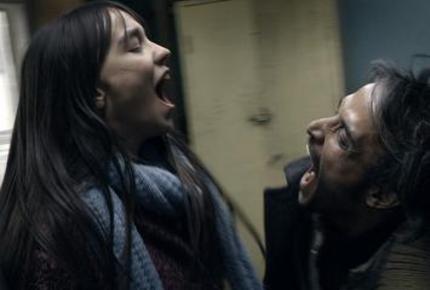LIFF 2010: KOSMOS review

Reha Erdem's brilliant Kosmos is strange in a way few films beyond experimental cinema ever manage to be. The story of a visitor to a lonely, insular Turkish city and how the people there react to him, it's not merely that it's one of those movies where nothing makes much logical sense or that it tackles very highbrow themes without a shred of irony. Above all else it never seems particularly interested in explaining itself, never throwing the audience more than a cursory bone to help them understand what's going on.
The stunning cinematography makes it obvious pretty early on there's more to Erdem's film than empty arthouse posturing, and there are enough moments of wonder dotted throughout the running time to keep reinforcing that idea, but even the most patient viewer will probably wonder at some point whether it's worth sitting through the whole thing.
Yet persevere until the home stretch, and Kosmos does come together. Story threads are suddenly, elegantly wound up. The tone grows steadily darker and the whole thing closes on a quietly devastating note of pathos that - while it doesn't answer every question - demonstrates Erdem knew precisely what he was doing all along.
Kosmos (Sermet Yesil) doesn't seem to have planned on stopping, at least to start with. He's introduced running through the wilderness in the snow, weeping to himself, and merely stops by the river running past the outskirts of town to try and hide something in the rocks. Then he's distracted by a scream. A young boy's fallen into the river. When Kosmos drags him out his older sister Neptun (Türkü Turan) assumes he's brought her brother back to life.
The townsfolk don't know what to make of Kosmos. He acts like a forgetful child, constantly distracted by something no-one else can see, but he comes out with aphorisms like a scholar. Whether or not he revived the boy, he does seem to be able to see right to the heart of people's problems, curing illness and counselling the troubled without any thought of reward. Everyone thinks Kosmos must be some kind of magician, and he's left largely to his own devices. But it turns out not everyone appreciates his help, with some violently rejecting his suggestions.
Conversations play out in solemn, theatrical cadences. Everything comes loaded with obvious deep meaning. We do see some characters doing relatively mundane things (manual labour, or taking out the trash), unlike some arthouse productions, but it's only ever to stand in for a plot point or underlying theme. Nothing is ever set out in black and white. The people guard their borders closely, arguing over the prospect of closer relations with a neighbouring city - though we never find out conclusively what sets the two apart beyond the general idea they're just different.
On top of this there's the general impression Kosmos himself isn't very likeable, or at least relatable. He's so removed from worldly concerns as to seem almost alien, utterly unconcerned about the harm he might be causing, then terrified by the idea he's done anything wrong. He seems incapable of interacting with people in any normal way, taking what he needs, reacting on an almost animal instinct. For most of his scenes with Neptun they even communicate in wordless, birdlike screams.
Ridiculous as that probably sounds, it's these scenes that anchor the film. Kosmos is much more than a simple messiah figure, and it's Neptun who's the first one to really see that. Under his childlike mannerisms there's something basically decent but inhuman, otherworldly and not a little frightening, and she's responding to him as honestly as she knows how. The couple share a love scene of sorts later in the film - there's no nudity, let alone sex, but they're clearly expressing something much more than a platonic bond. It's an astonishing moment, raw, naked and emotive; it's pure joy translated into some absolutely jaw-dropping visuals and sound design, and part of the tragedy of the story is the way not everyone else can connect with Kosmos on a similar level.
At the same time, Erdem seems to give the impression Kosmos can't force that connection, either, that he doesn't fully understand what he's capable of. He's the one who sets the climax in motion when one of his interventions goes badly wrong, and you can draw a number of parallels here - basic human obstinacy in the face of the truth, the way people with the answers often can't explain them, and how these relate to the Turkish struggle for identity. The effort required to puzzle out the story is sometimes frustrating, and many people - understandably - won't want to bother. But the pieces are definitely there.
Kosmos
is too dense, too obtuse to be an outright masterpiece. You get the
feeling Erdem leaves his audience hanging a little too long, and
dresses up a little too much of the narrative in what is basically
smoke and mirrors, however attractive. It's not a film for everyone
(plus one character works at a slaughterhouse, and vegetarians or the
squeamish may want to stay away from the repeated shots of dying animals). But
it's still a gorgeous, bittersweet parable deeper and more
intelligent than countless better-known films covering the same
ground, and for those prepared to put the work in the payoff is
immense. Flawed though it might be Kosmos still qualifies as one of
the best films of the year, and comes hugely recommended.
(Kosmos was screened as part of the 24th Leeds International Film Festival.)







